I know that some who subscribe to our free Hearts & Minds BookNotes newsletter do so because they are eager for our sale prices on important new books. They like to hear what we recommend each week and they appreciate – or so we hear – our diverse selection. We stock a lot of books that might be considered mainline denominational and progressive theologically, and we have a huge selection of what might be considered thoughtfully conservative/evangelical. Not to mention Catholic and Orthodox authors and nearly everything in-between. Likewise with our cultural studies and current affairs books — a bit of everything, carefully chosen. We regularly hear that folks like learning about titles we are most interested in, especially when they are books they might not otherwise have heard of or otherwise considered.
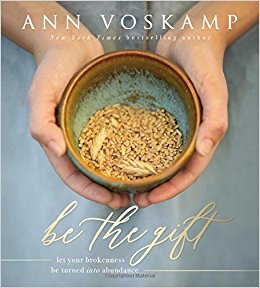
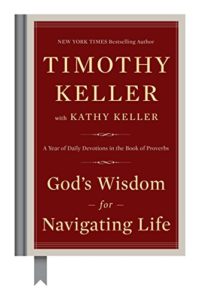 We also regularly write, about bestsellers including relatively simple, inspiring, religious titles that dominate the Christian bookstore marketplace – the brand new gift book by Ann Voskamp with full-color photography called Be the Gift: Let Your Broken Be Turned Into Abundance is a wonder, not unlike another we highlighted lately, Love Heals by Episcopal priest and activist Becca Stevens, or consider the brand new devotional on Proverbs by Tim & Kathy Keller, God’s Wisdom for Navigating Life: A Year of Daily Devotions in the Book of Proverbs
We also regularly write, about bestsellers including relatively simple, inspiring, religious titles that dominate the Christian bookstore marketplace – the brand new gift book by Ann Voskamp with full-color photography called Be the Gift: Let Your Broken Be Turned Into Abundance is a wonder, not unlike another we highlighted lately, Love Heals by Episcopal priest and activist Becca Stevens, or consider the brand new devotional on Proverbs by Tim & Kathy Keller, God’s Wisdom for Navigating Life: A Year of Daily Devotions in the Book of Proverbs
And we’ve got all kinds of mainstream, general-market bestsellers, too.
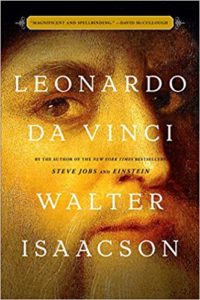 What bookstore wouldn’t want to carry any new biography by Walter Isaacson (the new one is on Leonardo Da Vinci) or the latest Ron Chernow, famous for Alexander Hamilton, simply called Grant? What bookstore that has any desire to offer deeper analysis of the culture wouldn’t be happy to stock stuff like Kurt Andersen’s Fantasyland: How American Went Haywire: A 500 Year History or the important collection of pieces posthumously collected called Scalia Speaks: Reflections on Law, Faith, and Life Well Lived (with a forward by Ruth Bader Ginsburg, no less.) My goodness, shouldn’t every bookstore carry the companion book to the much-discussed Ken Burn’s PBS series, The Vietnam War: An Intimate History and the remarkably written collection by Ta-Nehisi Coates, We Were Eight Years in Power: An American Tragedy.
What bookstore wouldn’t want to carry any new biography by Walter Isaacson (the new one is on Leonardo Da Vinci) or the latest Ron Chernow, famous for Alexander Hamilton, simply called Grant? What bookstore that has any desire to offer deeper analysis of the culture wouldn’t be happy to stock stuff like Kurt Andersen’s Fantasyland: How American Went Haywire: A 500 Year History or the important collection of pieces posthumously collected called Scalia Speaks: Reflections on Law, Faith, and Life Well Lived (with a forward by Ruth Bader Ginsburg, no less.) My goodness, shouldn’t every bookstore carry the companion book to the much-discussed Ken Burn’s PBS series, The Vietnam War: An Intimate History and the remarkably written collection by Ta-Nehisi Coates, We Were Eight Years in Power: An American Tragedy.
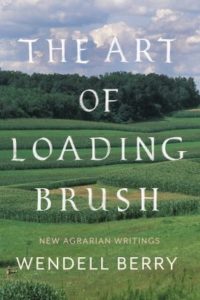 Speaking of important new non-fiction, if you follow us at all on social media you know we’ve been celebrating a new hardback collection of agrarian essays by Wendell Berry, nicely entitled The Art of Loading Brush.
Speaking of important new non-fiction, if you follow us at all on social media you know we’ve been celebrating a new hardback collection of agrarian essays by Wendell Berry, nicely entitled The Art of Loading Brush.
I am sorry I don’t take enough time here to tell you about important novels such as New People by Danzy Senna or Little Fires Everywhere by Celeste Ng, or Swingtime by Zadie Smith or poetry like The Sun and Her Flowers, the new one from Rupi Kaur.
Oh my, there are a lot of great new books.
Let me be honest: I started off listing these recent books for three reasons.
Firstly, we need to continue to get the word out that we carry all kinds of books and that we are looking for readers to order books from our full-service independent bookstore. No matter what your tastes or topics, we here at the shop would be eager to serve you further.
Secondly, I wanted to highlight some authors you might be familiar with if you are a fairly general reader – I really hope you know Voskamp and Coates and Keller and Berry – mostly because I’m about to share some titles that might seem, in comparison, a bit (shall we say) less than mainstream, edging towards the obscure. I don’t want you to think our bookstore is (too) weird. We really do have a great selection of normal, good books.
Thirdly, we list some of these popular bestsellers that we stock because I want those new to BookNotes to know that what I share below is a little unusual; we don’t always tell such long-winded, personal stories about our own background, and we know that our own eccentric past and unique tastes are, admittedly, maybe not for everyone. But marketers say that these days loyal customers usually do care about the story behind a business; sure, the fact is that we sell books, but for those of you who sense some connection to us here in south central Pennsylvania, you should know a bit more of what makes us tick. We aren’t just a faceless algorithm toting up data but we are telling a story in our shop, here. We’d like to think that maybe you are part of it, too. Maybe hearing some of what has influenced us will help you curate your own lives and legacy.
ADVENT LIST COMING SOON
In a day or so we’ll do a big list of Advent books which should appeal to everyone, so please bear with us now as we share some of our back-story, and few heady lines about a very moving event we had the privilege of serving this past weekend in our old stomping ground out in Pittsburgh PA. We thought you might like to hear about it.
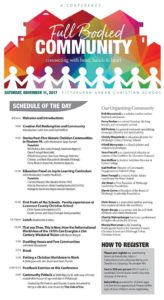 BOOKS AT THE FULL BODIED COMMUNITY CONFERENCE
BOOKS AT THE FULL BODIED COMMUNITY CONFERENCE
It was a conference called “Full Bodied Community.”
That event was organized by a group of old friends, mostly, most who we met in the mid 1970s, with some younger energy coming from a handful of folks currently involved with the CCO campus ministry with whom I serve as an associate staff; Beth and I, you probably know, attend a lot of their staff training events as booksellers and as occasional speaker.)
We want to mention some of the important books we sold there and mention a few we wish we had had time to promote better for that particular audience.
But first, I hope you don’t mind learning (or hearing again, if you know us well) a bit about this event, the movement from which it grew, and why it matters so much to us.
BIG BACK-STORY
To do that, you have to bear with me even more. Allow me a few quick moments to remind you of, if you don’t know, a bit about our own story and how we ended up speaking and selling books at the Full Bodied Community Conference at Pittsburgh Urban Christian School.
You see, as I explained in my talk at the event, my own faith journey included a nearly schizophrenic sense in the early 1970s of being part of two or three colliding movements, two or three groups that seemed to care little for each other.
I imagined myself a bit of a social action guy during the tail end of the 60s counter-culture. I was part of the first-ever Earth Day (thanks, mom, and to whoever from church loaned us that pickup truck) and was a conscientious objector during the last years of the draft. As a follower of Christ I wasn’t into the “sex, drugs, and rock-n-roll” of those rowdy years (well, maybe the rock-n-roll part) but I did care about civil rights stuff, worked against the death penalty, attended the first ever national Right-to-Life conference, picketed and boycotted with the United Farm Workers – standing for what we nowadays call “fair trade” practices for migrant workers — advocated for the Americans with Disabilities Act (I was a special ed major and met life-long friends at a camp for handicapped kids) as well as the American Indian Movement (not unrelated to the Standing Rock protests of this past winter.) The odd thing was that none of my fellow Jesus Freaks cared one whit about any of this. Nada.
There were some devout Roman Catholics that I met in 72 or so who had a consistent pro-life vision and helped me resist both the on-going war in Viet Nam and the nuclear arms race, got us involved in Amnesty International, and came to understand the awfulness of Roe v Wade in unleashing unlimited abortion-on-demand.They stood with workers and helped me get involved in a nationally-known safe energy movement. We worked for anti-hunger policies through Bread for the World and learned about boycotting Nestles, not to mention companies that wouldn’t divest from apartheid South Africa. We started a crisis pregnancy center at my college. Almost universally, my evangelical friends had little interest in joining in any of the campaigns or causes.
I will never forget when one Christian gal involved in charismatic giftings said that fighting hunger was against God’s will. Another woman, when I said we should do a Bible study on Amos or Micah, for once, said maybe I had a demon because I was interested in political change.
That wacky stuff aside, I also want to understand what was being debated in the university proper and was curious about the counter-cultural critique of the rational, bland, secularity of the establishment. I wanted to study what was “happening in the air” by reading existentialist literature and paying attention to bohemian artists and learning from the best philosophical critiques of what eventually I learned to call modernity.
I was really disillusioned with some mainline denominational pastors I met who didn’t want to read the Bible at all and seemed to have little regard for evangelism and prayer, and seemed to resent the vibrant faith of younger evangelicals. I didn’t understand their disinterest in conversion and spirituality or their typically critical attitude about the Scriptures. I met one young man at a faith-based peace protest who was in seminary who was an agnostic at best, and was on his way to be affirmed by his denomination as a pastor.
I don’t know if you know what I’m talking about but I felt like I knew folks who loved Jesus but didn’t care about the world or its needs.
On the other hand there were people I knew who cared deeply about the world and its concerns but had no interest in faith or any solutions that would be connected to historic faith.
Theodore Roszak, in an often-read book from those years that I still cite as an example of the quandary of those days, famously said that “Christianity, while still personally engaging for some, has become culturally irrelevant.”
I loved my social action hippy friends even though they mocked my faith. I loved my brothers and sisters in Christ, even though they hardly tolerated my interest in world poverty, environmentalism, and making some impact in the world outside our fellowships and churches. I was lonely in many ways, and frustrated, but tried always to unite these two different communities.
Liberal Christianity didn’t have the wherewithal to offer radical challenges to the culture because the churches I knew seemed so comfortable, accommodated to the world (despite what Bonhoeffer and Kierkegaard and Martin Luther King, Jr. implored.) Evangelicalism was my newfound spiritual home, and I loved the zeal of the charismatics who seemed so full of the Spirit, even though they had their head in the clouds — “so heavenly minded they were no earthly good” was a fair description.
And the SDS type radicals were slowly losing their way, ending up in cults or drugs or back-to-nature communes, giving up the struggle for a just and healthy world. These were the days of Patty Hearst and Jim Jones and the political counter-cultural moving to the hard, Marxist left.
I could say more about the cluelessness of many churches and the harshness of many left-wing activists as well as heroic Christian folks we met in those years from Phil Berrigan to John Perkins, from Dorothy Day to Millard Fuller. But you get the point. Roszak, it seemed, was mostly right.
And into this quandary of being a church kid wanting to change the world, I met a world of folks who were doing just that, thoughtfully engaging the times, aware of the films and music and politics of the counter-culture, but moving beyond its dead end bankruptcy.
There were writers like Francis Schaeffer, wonderful witnesses like Os Guinness, new heroes from Ron Sider to Richard Mouw to John Perkins. We learned of evangelical feminists and Biblically-based racial reconciliation and Christian ecological activists working on what we called “Earth-keeping” and “creation care.” I discovered a new kind of Christian literature, Biblically grounded but culturally engaged. I discovered Thomas Merton and Jacques Ellul and James Sire and William Stringfellow and C.S. Lewis and Letha Scanzoni and Virginia Mollenkott and Lewis Smedes. I started reading King and a Mennonite named John Howard Yoder (who years later was disgraced as a sexual abuser.) A whole world opened up to me that I knew nothing about.
And, importantly, I met a professor who travelled from college to college, offering adjunct workshops and seminars on Christian perspectives on society and truly faithful ways of thinking about issues, related to a old tradition I never heard of.
His name was Peter J. Steen.
He and his colleagues changed my life.
He told us about a revival of faith and social renewal in Holland in the late 1800s into the early 1900s, lead by an extraordinary Dutch thinker named Abraham Kuyper.
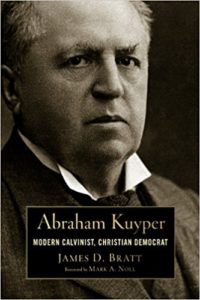 Forgive me if you’ve heard all this before but Kuyper became a leader in the Reformed churches in Holland in the very late 1800s; he was an exceptionally vibrant intellectual leader, first a pastor/theologian who became a journalist, started a university, a political party, and eventually Prime Minister. Those today who draw on his particular kinds of insights sometimes call themselves Kuyperians. There is a major collection and study center at Princeton Seminary about Kuyper, although few there pay it much mind.
Forgive me if you’ve heard all this before but Kuyper became a leader in the Reformed churches in Holland in the very late 1800s; he was an exceptionally vibrant intellectual leader, first a pastor/theologian who became a journalist, started a university, a political party, and eventually Prime Minister. Those today who draw on his particular kinds of insights sometimes call themselves Kuyperians. There is a major collection and study center at Princeton Seminary about Kuyper, although few there pay it much mind.
Kuyper’s offered a robust call to renew the social architecture of the secularizing culture – yes, even in the early 1900s there were the tectonic shifts in what was formerly terra firma which lead to rationalistic faith in science, economic growth, technology, and bureaucracy to solve our problems, privatizing faith at best, eliminating it altogether; think of C.S. Lewis’s Abolition of Man a half century later, just to be reminded of the dehumanization and loss of meaning and beauty that was creeping into the West. Kuyper’s work was, in that first half of the century, second only in this regard to the magisterial Rerum Novarum, the stunning social teaching of Pope Leo XIII, who also warned about the secularizing forces of late modern capitalism. See, for a good comparison, by the way, the useful, little book Makers of Modern Christian Social Thought: Leo XIII and Abraham Kuyper on the Social Question edited by Jordon Ballor, published by the Acton Institute ($14.95.)
As the publisher explains about that book:
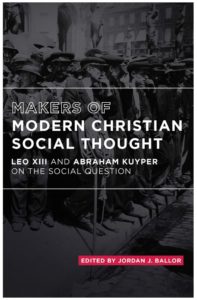 Leo XIII’s encyclical on the relationship between capital and labor (Rerum Novarum) and Abraham Kuyper’s speech to the first Christian Social Congress (“The Social Question and the Christian Religion”), both published in 1891, are foundational sources for subsequent Christian social thought in their respective traditions—Roman Catholic and Reformed. This volume, in celebration of the 125th anniversary of these two landmark publications, includes authoritative English translations of these works and an introduction that outlines their context and significance. The thought of these two theologians—one an Italian scholar-pope and the other a Dutch Reformed pastor, professor, and politician—provide enduring wisdom for developing and articulating a Christian witness in the modern world.
Leo XIII’s encyclical on the relationship between capital and labor (Rerum Novarum) and Abraham Kuyper’s speech to the first Christian Social Congress (“The Social Question and the Christian Religion”), both published in 1891, are foundational sources for subsequent Christian social thought in their respective traditions—Roman Catholic and Reformed. This volume, in celebration of the 125th anniversary of these two landmark publications, includes authoritative English translations of these works and an introduction that outlines their context and significance. The thought of these two theologians—one an Italian scholar-pope and the other a Dutch Reformed pastor, professor, and politician—provide enduring wisdom for developing and articulating a Christian witness in the modern world.
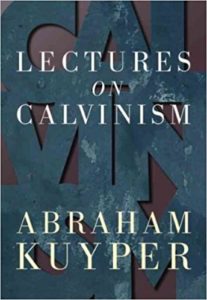 Kuyper’s social vision, his passion for pluralism and democracy and a Christ-honoring order of social shalom, goodness, and justice for all, rooted in a broad and visionary application of Calvinism to all areas of life, was famously explained in his “Stone Lectures” at Princeton University in 1898 (still in print as Lectures on Calvinism; we stock the proper Eerdmans edition that sells for $18.00 or the Hendrickson hardback for $14.95.)
Kuyper’s social vision, his passion for pluralism and democracy and a Christ-honoring order of social shalom, goodness, and justice for all, rooted in a broad and visionary application of Calvinism to all areas of life, was famously explained in his “Stone Lectures” at Princeton University in 1898 (still in print as Lectures on Calvinism; we stock the proper Eerdmans edition that sells for $18.00 or the Hendrickson hardback for $14.95.)
When added to some feisty reformed philosophy of culture (largely generated at the Vrije (Free) University of Amsterdam, the university Kuyper founded) by heavy continental philosophers Herman Dooyeweerd and D. H. Th. Vollenhoven it developed into a global, worldviewish movement that has come to be called neo-Calvinism.
[This is not to be confused, for the record, with a recent fascination for traditional Calvinism among highly organized and often publishing young evangelicals and older leaders in the Gospel Coalition and Southern Baptist circles, which some unhelpful journalists wrongly call neo-Calvinism. That recent appreciation of conventional, older-school Calvinism (call it a new interest in old Calvinism) is a robust force in American evangelicalism these days – think of the massive Passion conferences or the many books by John Piper or nearly anything coming out of Crossway Publishing. Such influential Calvinism might more accurately be described as a neo-Puritanism, and isn’t quite the same as the Dutch Dooyeweerdian strain in the line of Abraham Kuyper that has for decades been called neo-Calvinism. If any of this is interesting to you, read my friend Bob Robertson’s piece about this here.]
Anyway, after World War II there was a significant influx of neo-Calvinist Dutch folks coming as immigrants to the shores of both the US and Canada. As Kuyperians they were used to an orthodox but generous “wide as life” view of discipleship and a wholistic view of the Kingdom of God defined largely as “creation-being-restored” — the sort of view of the good creation (and God’s common grace within it) which lead to culture-making and renewing efforts of public life which included stuff like faith-based art movements and Christian labor unions and Christian farmer’s organizations and serious missions to offer Biblical witness in higher education, and even third-way political parties that they knew back in Holland. I’ve heard older Dutch immigrants decades ago still expressing surprise that American Presbyterianism and Reformed evangelicalism had so little interest in reforming culture and no robust institutional witness in the various realms and spheres of society. Why no Christian political party or a world-class Christian university? (This was, of course, before the disastrous rise of the so-called Christian right, with embarrassing, thoughtless leaders like Falwell and Pat Robertson trying to speak into the public square. That is not what the great grand-children of Kuyper with his commitment to principled pluralism were hoping for!)
Uneducated farmers and blue-collar workers in the 60s saved nickels and dimes to support a uniquely Reformed Christian graduate school in North American since in the middle of the 20th century there was no such place. One could get advanced degrees in theology, of course, and there were fine Christian institutions of higher learning for undergrads (although in those years it was rare to hear much about the integration of faith and learning; Christian higher education was often practiced as teaching regular stuff in regular ways, but with wholesome campus life and required chapel added on; the dualism between the classroom and the chapel was huge and the lack of a distinctive intellectual tradition of “taking every idea captive for Christ” was, even in well known Christian colleges, virtually nonexistent.) If one wanted to study evangelical Protestant thinking as it related to politics or science or philosophy or art or economics or history or psychology at the graduate and PhD level, there simply was no such learning community to be found anywhere.
 The Institute for Christian Studies was founded, then, fifty years ago, for just such a purpose –- not to offer theology as such or Biblical studies or pastoral preparation, but to work out of a (Christian) philosophical orientation that could contribute to a true “inner reformation of all the sciences” as Dooyeweerd put it — in a building near the University of Toronto. It attracted some deep thinkers and those disillusioned (perhaps like I was) in conventional churchianity and pious evangelicalism, since neither seemed to have the resources or capacity to make a serious philosophical contribution to the renewal of the culture.They were fired up about bringing fresh reform to their own tradition and opened their doors to “junior members” who would do high level philosophical research ion various disciplines in the name of Christ.
The Institute for Christian Studies was founded, then, fifty years ago, for just such a purpose –- not to offer theology as such or Biblical studies or pastoral preparation, but to work out of a (Christian) philosophical orientation that could contribute to a true “inner reformation of all the sciences” as Dooyeweerd put it — in a building near the University of Toronto. It attracted some deep thinkers and those disillusioned (perhaps like I was) in conventional churchianity and pious evangelicalism, since neither seemed to have the resources or capacity to make a serious philosophical contribution to the renewal of the culture.They were fired up about bringing fresh reform to their own tradition and opened their doors to “junior members” who would do high level philosophical research ion various disciplines in the name of Christ.
And, yes, Pete Steen was bridge between the CCO and other emerging communities in Eastern Ohio and throughout Western Pennsylvania.
ICS was misunderstood right from the start as the Canadian government wanted to accredit them as a seminary, which they had to go to court to resist, since they were, in fact, not a seminary. Few could even imagine that Christians wanted to study in light of Biblical faith, philosophers such as Kant or Derrida, economists such as Marx or Samuelson, linguists like Chomsky or Charles Taylor, political scientists like Seymour Lipset, Hannah Arendt, or Eric 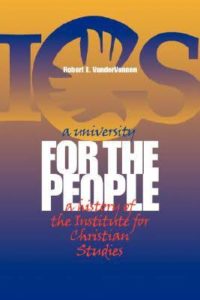 Voegelin, or sociologists like Auguste Comte, Emil Durkheim, or Jurgen Habermas, bringing a Christian evaluation to each of these influential scholars in their respective scholarly fields. Some ordinary churches – maybe even some that seemed Kuyperian – were worried that they were too edgy and radical in their thinking. The story of their founding can be found in an interesting book called A University for the People: A History of the Institute for Christian Studies by Robert Vandervennen (Dordt College Press; $18.00.) Here is a link from their website that explains their background. I visited there more than once during my college years — meeting remarkable scholars who are friends yet today like Paul Marshall and Stanley Carlson-Thies and Brian Walsh.
Voegelin, or sociologists like Auguste Comte, Emil Durkheim, or Jurgen Habermas, bringing a Christian evaluation to each of these influential scholars in their respective scholarly fields. Some ordinary churches – maybe even some that seemed Kuyperian – were worried that they were too edgy and radical in their thinking. The story of their founding can be found in an interesting book called A University for the People: A History of the Institute for Christian Studies by Robert Vandervennen (Dordt College Press; $18.00.) Here is a link from their website that explains their background. I visited there more than once during my college years — meeting remarkable scholars who are friends yet today like Paul Marshall and Stanley Carlson-Thies and Brian Walsh.
But here’s what is important, really important.
Through Dr. Steen, some of their founders and boosters – many who spoke still with a heavy Dutch accent and had stories of standing as children against the Nazi’s in their occupied homeland – ended up forming friendships with other people in the Reformed and Presbyterian tradition in Philadelphia and the greater Pittsburgh area.
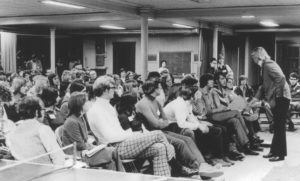
Some evangelical leaders I knew – such as the founders of Pittsburgh’s Coalition for Christian Outreach (CCO) that were being influenced by extraordinary thinkers like R.C. Sproul and Francis Schaeffer and also African American evangelicals like Tom Skinner and John Perkins – took notice.
You see, this influence contributed to Beth and I starting Hearts & Minds 35 years ago, and it began by learning about all this Kuyperian higher learning and social action stuff happening in Toronto and in Iowa and Grand Rapids and enclaves all over, all because of the aforementioned Peter J. Steen.
Steen was a Dutchman born in North Jersey who became a Dooyeweerdian philosopher after studying in Holland in this field of Christian philosophy. Pete had studied at Westminster Theological Seminary with a guy named Cornelius Van Til for a while, got a PhD at the Vrije, taught at a small college called Trinity in Palos Heights IL (where he teamed up with Calvin Seerveld, whose devotionals from those years, Take Hold of God and Pull are extraordinary) and ended up at Geneva College in Western Pennsylvania. After some conflict there he was eventually hired by the CCO to teach about what in those days we called a “world-and-life-view” and the implications of the Lordship of Christ over all of life. Soon enough he started his own ministry, “Christian Educational Services” or CES.
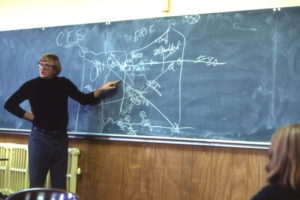 Steen travelled around tirelessly to various campuses and organized small conferences and hosting guest lectures by professors affiliated with “Toronto” which was short hand for the ICS grad school and other Kuyperian organizations there, from the Christian Farmers Federation to the Patmos Art Gallery.
Steen travelled around tirelessly to various campuses and organized small conferences and hosting guest lectures by professors affiliated with “Toronto” which was short hand for the ICS grad school and other Kuyperian organizations there, from the Christian Farmers Federation to the Patmos Art Gallery.
This Steen guy was larger than life, like some visionary combo of Francis Schaeffer and Tony Campolo, a righteous Saul Alinksy, a brilliant thinker, tireless organizer, passionate preacher, itinerant philosopher/social activist/teacher and bookseller.(He pressed into my hands my first Walter Brueggemann book, by the way, had us reading new urbanist Jane Jacobs before most people knew who she was, was the first person I ever heard quote Lesslie Newbigin – who himself understood Dooyeweerd’s critique of the autonomy of Enlightenment rationalism, by the way — and, of course, insisted we read Herman Dooyeweerd, which to this day I don’t really understand. I will never forget Steen ripping open a brand new case of hardback copies of The Roots of Western Culture in the ally behind the CCO home offices and making me promise I’d read it.)
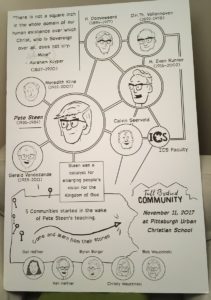 Through Steen, we came to meet the philosopher of aesthetics Calvin Seerveld, Al Wolters, the Biblical scholar (also with a degree in philosophy) and a member of the Dutch Parliament, an economist who later had influence in a significant working group of the World Council of Churches on globalization, named Bob Goudzwaard. From South African resistance leader Alan Boesak to (then) Notre Dame philosopher Nicholas Wolterstorff, from evangelical sociologist Mary Stewart Van Leeuwen to creation-care scientist Cal DeWitt, from world class philosopher Elaine Botha to one of the great interpreters of Kuyper for ordinary folks, who later became the President of Fuller Theological Seminary, Richard Mouw, from award-winning historian George Marsden to Roman Catholic mystic Adrian van Kaam to Alvin Plantinga (now widely considered one of the most important philosophers in the world) we in Western Pennsylvania – through this wild-man traveling seminar leader Pete Steen – met authors and leaders whose names and books are now, in some circles, themselves nearly legendary.
Through Steen, we came to meet the philosopher of aesthetics Calvin Seerveld, Al Wolters, the Biblical scholar (also with a degree in philosophy) and a member of the Dutch Parliament, an economist who later had influence in a significant working group of the World Council of Churches on globalization, named Bob Goudzwaard. From South African resistance leader Alan Boesak to (then) Notre Dame philosopher Nicholas Wolterstorff, from evangelical sociologist Mary Stewart Van Leeuwen to creation-care scientist Cal DeWitt, from world class philosopher Elaine Botha to one of the great interpreters of Kuyper for ordinary folks, who later became the President of Fuller Theological Seminary, Richard Mouw, from award-winning historian George Marsden to Roman Catholic mystic Adrian van Kaam to Alvin Plantinga (now widely considered one of the most important philosophers in the world) we in Western Pennsylvania – through this wild-man traveling seminar leader Pete Steen – met authors and leaders whose names and books are now, in some circles, themselves nearly legendary.
(The poster above was drawn by Sean Purcell, trying to show some of the influences from Kuyper through Steen to our Full Bodied Community event.)
I will never forget hearing Pete’s friend and fellow Kuyperian Dutchman Gerald Vandezande (who before his death was given any number of honorary awards for his relentless advocacy for public justice in Canada) who was leading protests in the courts against a large oil pipeline that was disrupting the land and culture of First Nation peoples in the MacKenzie Valley of Canada, and how they linked it to our spiritually-bereft, economically rich over-development, exposing the idolatry of our dependency on fossil fuels. This was in the 70s, long before Bill McKibben and others have made equally cogent cases against the XL Pipelines. To hear theologically conservative Calvinists talk like this was nearly overwhelming, new, transforming.
Some of you know where this is going: as I’ve suggested, I met Pete in my college years, and he had a huge impact on my faith, my vision of the meaning of discipleship and social action, and, eventually, Beth and I —-hailing from small town mainline churches that never heard of such stuff – dove into helping form social action organizations, alternative inner city schools, philosophy clubs, arts and theater ministries, reading groups, and other social platforms to help promote what we started calling reformational worldview. Steen’s philosophical Kuyperianism wasn’t the only influence on us, but it was decisive.
And from that deep dive into the nature of worldviews we came to get a vision for what our bookstore would be.
Granted, some have used the world worldview to merely catalogue other 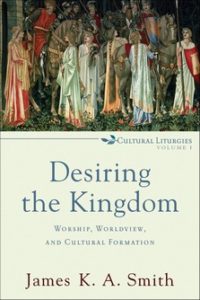 religions and in some circles the word seems to imply mean-spirited critique of other’s life visions. Philosopher Charles Taylor uses the phrase social imaginaries to conjure a sense of these imagined assumptions and Jamie Smith in Desiring the Kingdom, drawing on ICS professor James Olthius and worldview scholar and storyteller Brian Walsh, reminds us that worldviews aren’t just intellectual ideas, presuppositions, not even quite “glasses” but storied, imagined, ways of life, shaped by our deepest longings and desires. Some Kuyperians who use this lingo released a book a bit ago called After Worldview edited by Matt Bonzo and Michael Stevens (Dordt College Press; $13.00) wondering if the phrase is still viable. So there has been on-going consideration of the word worldview, but learning about it — starting with its German root weltanschauung on through the extraordinary, thorough study released a decade ago, Worldview: The History of a Concept by David Naugle (Eerdmans; $34.00) — set us on a journey to love books, literature, reading.
religions and in some circles the word seems to imply mean-spirited critique of other’s life visions. Philosopher Charles Taylor uses the phrase social imaginaries to conjure a sense of these imagined assumptions and Jamie Smith in Desiring the Kingdom, drawing on ICS professor James Olthius and worldview scholar and storyteller Brian Walsh, reminds us that worldviews aren’t just intellectual ideas, presuppositions, not even quite “glasses” but storied, imagined, ways of life, shaped by our deepest longings and desires. Some Kuyperians who use this lingo released a book a bit ago called After Worldview edited by Matt Bonzo and Michael Stevens (Dordt College Press; $13.00) wondering if the phrase is still viable. So there has been on-going consideration of the word worldview, but learning about it — starting with its German root weltanschauung on through the extraordinary, thorough study released a decade ago, Worldview: The History of a Concept by David Naugle (Eerdmans; $34.00) — set us on a journey to love books, literature, reading.
READ FOR THE KINGDOM
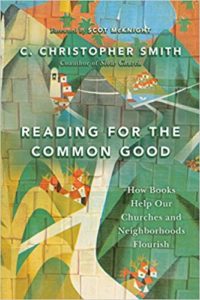 I wasn’t much of reader until I learned that God cared about all this stuff and that thinking well about the deepest issues and the foundational matters that must be grappled with if we are going to make a lasting difference demands that we read widely. I think it was mostly this reformational worldview and other similar strains within world-transformative faith that God used to give me a passion for reading and teaching others about good books. Nowadays, I point people to Reading for the Common Good by C. Christopher Smith (IVP; $16.00) to help express “How Books Help Our Churches and Neighborhoods Flourish” as the best reminder of all this.
I wasn’t much of reader until I learned that God cared about all this stuff and that thinking well about the deepest issues and the foundational matters that must be grappled with if we are going to make a lasting difference demands that we read widely. I think it was mostly this reformational worldview and other similar strains within world-transformative faith that God used to give me a passion for reading and teaching others about good books. Nowadays, I point people to Reading for the Common Good by C. Christopher Smith (IVP; $16.00) to help express “How Books Help Our Churches and Neighborhoods Flourish” as the best reminder of all this.
I don’t know if Steen used the slogan, but I started calling out “read for the Kingdom!” to rally folks to the book tables at our events. In a way, if you appreciate Hearts & Minds, you should thank the late, great Peter J. Steen.
JUBILEE
Perhaps the most enduring outgrowth of those years working with others in Western Pennsylvania was Steen’s influence within the CCO — they still used the phrase “whole life discipleship” and seek to help students integrate faith and learning, as seen in wonderful books such as Derek Melleby & Don Optiz’s Learning for the Love of God: A Student’s Guide to Academic Faithfulness (Brazos; $14.99.) And, of course, how we developed the Jubilee Conference.
(See HERE for the stunning trailer for last years conference if you don’t quite know what I’m referring to. Please, please see the longer spoken word version that kicked off the conference last year, HERE — it is only 7 minutes and you will be blown away, knowing this was shown too 3000 college students. HERE is the loudly colorful trailer for this year’s event. And HERE I am doing a 20-minute talk on Sunday morning of the conference two years ago at its 40th anniversary. If I had more time I would have explained to the college crowd our deep, deep debt to Pete Steen for introducing us to this whole vision of a renewed Earth and the subsequent calling to develop the Christian mind, allowing ideas to grow legs and shape within us new practices in how we live out our faith, even in our careers, giving embodied flesh to the big hope of a Christian worldview.)
Well, I could say more about our back-story, about how all of that lead Beth and I to start Hearts & Minds, including our stocking books about the interface of faith and work, business, art, education, science, engineering, nursing, film studies, and the like, but will restrain myself to telling just these two final points (and some quickie book suggestions, leading up to the big list.)
1. Our Hearts & Minds bookstore is said to be unlike any other Christian bookstore in the land. I don’t know if that is true, and there are great ones we respect – Eighth Day Books in Wichita comes to mind… But insofar as we are trying something somewhat rare here, we owe it to what we learned in Pittsburgh during the late 70s as we were influenced by folks from ICS and others in that creation-regained worldview movement that swept through Western PA in those years. I often say that reading an early Os Guinness book was very seminal for me; James Sire on developing the Christian mind; meeting a rowdy itinerant bookseller named Wes Seerveld who accompanied Pete Steen was also a real inspiration. I explain all this stuff about Kuyper and ICS and reading for the Kingdom as we develop the Christian mind for hopeful discipleship so that you understand who we are and what we’re about here at Hearts & Minds. It’s our story, and hopefully, in one way or another, yours too.
2. Everywhere Pete informally taught (often in church classrooms, collegiate resident hall basements, even over McDonald’s tables) groups that took Kuyper and Dooyeweerd, and reformational scholars like James Skillen and Evan Runner, Bob Goudzwaard and Calvin Seerveld, and their books seriously, concluded that we needed to stick together to figure this stuff out. Not unlike the famous Clapham community that former around William Wilberforce we realized we needed to be – as the saying went in those days – “living together in a world falling apart.” That is, house-holding in intentional community, living communally, or at least as near-by neighbors in specific neighborhoods, became part of the story. We visited or corresponded with several other intentional communities (from Reba Place to Sojourners to Voice of Calvary to The Other Side community in Germantown to learn about models and approaches.) When modern mega-churches try to mitigate the often atomized, suburban ethos of their large congregations by saying they should “do life together” it makes me glad.
The “Full Bodied Community” event this past weekend was, in a sense, an opportunity to tell the stories of some of those intentional communities, including one Beth and I helped found, now called the “Rippey Street Community” on and around Rippey Street in the East Liberty neighborhood of Pittsburgh. Folks from rust-belt Newcastle and Beaver Falls shared their stories, too, and folks enjoyed hearing from some of us about the efforts of being good stewards of homes – some geodesic domes, even – and the strengths and weaknesses of a “theology of geography” and a “communal imagination” that grew up alongside the neo-Calvinist reformational movement in Western PA.
Such talk reminds me of the upbeat and insightful book Renovate: Changing Who You Are By Loving Where You Are by Leonce Crump (Multnomah Press; $14.99) a book I highlighted at the conference. I love it! Alan Brigg’s Staying is the New Going: Choosing to Love Where God Places 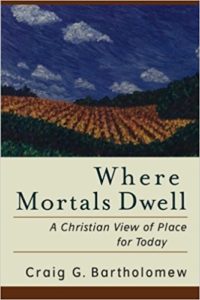 You (NavPress; $14.99) offers a similar missional vision for our place, and is a sweet read, too. We also displayed a new book about place — set in Philadelphia, written by a person I think might have known Pete, through a wholistic urban minister named Harvie Conn, back in the day — called Place Matters: The Church for the Community by Bill Krispin & Coz Crosscombe (CLC Publications; $13.99.) The most significant theological work written on any of this comes from an ICS-related scholar, Craig Bartholomew, entitled Where Mortals Dwell: A Christian View of Place for Today (Baker Academic; $32.00.) Less academic but an excellent, enjoyable book is one I often show off, No Home Like Place: A Christian Theology of Place by Leonard Hjarlmarson (Urban Loft; $16.99.) This stuff is all urgent reading, I think, making sure our theology and perspectives are, as they say, grounded.
You (NavPress; $14.99) offers a similar missional vision for our place, and is a sweet read, too. We also displayed a new book about place — set in Philadelphia, written by a person I think might have known Pete, through a wholistic urban minister named Harvie Conn, back in the day — called Place Matters: The Church for the Community by Bill Krispin & Coz Crosscombe (CLC Publications; $13.99.) The most significant theological work written on any of this comes from an ICS-related scholar, Craig Bartholomew, entitled Where Mortals Dwell: A Christian View of Place for Today (Baker Academic; $32.00.) Less academic but an excellent, enjoyable book is one I often show off, No Home Like Place: A Christian Theology of Place by Leonard Hjarlmarson (Urban Loft; $16.99.) This stuff is all urgent reading, I think, making sure our theology and perspectives are, as they say, grounded.
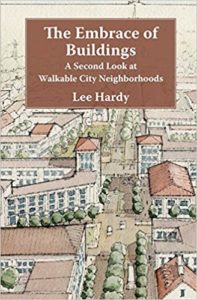 Interestingly, another book that fits in here has direction connections to the reformational movement in 1970s Western Pennsylvania. Again, I’m not making this stuff up — it’s a lovely little book that was just published (which I had a tiny hand in, helping just a bit with the bibliography.) It is called The Embrace of Buildings: A Second Look at Walkable City Neighborhoods (Calvin College Press; $16.99) by Lee Hardy. It is a wonderfully interesting book, highly recommended to all BookNotes fans. And guess what? Hardy was influenced by Pete Steen when Lee was studying in Pittsburgh in the late 70s. He has made his mark as a philosopher and college teacher, and has published some good work, but this captures a wonderful avocation of his, perhaps started when Steen helped many of us discover Jane Jacobs so many years ago.
Interestingly, another book that fits in here has direction connections to the reformational movement in 1970s Western Pennsylvania. Again, I’m not making this stuff up — it’s a lovely little book that was just published (which I had a tiny hand in, helping just a bit with the bibliography.) It is called The Embrace of Buildings: A Second Look at Walkable City Neighborhoods (Calvin College Press; $16.99) by Lee Hardy. It is a wonderfully interesting book, highly recommended to all BookNotes fans. And guess what? Hardy was influenced by Pete Steen when Lee was studying in Pittsburgh in the late 70s. He has made his mark as a philosopher and college teacher, and has published some good work, but this captures a wonderful avocation of his, perhaps started when Steen helped many of us discover Jane Jacobs so many years ago.
From growing ones own healthy foods to having resources to do hospitality (taking in the hurting and needy) to learning the basic skills of “body life” in ways that ordinary churches often don’t, we heard of stories of ways Steen’s all-of-life-redeemed vision called forth a deeper desire to live in ways other than the “do your own thing” individualism. We heard from several locales about efforts to do life together that continue on to this day.
At the weekend conference we realized afresh some important things:
That we were influenced in our idealism by the colorful teaching and Kingdom instigation of Pete Steen is certain. At the event we recalled his legacy.
That we took cues from Toronto’s ICS is no surprise. Our conference was more storytelling and inspiration so wasn’t a workshop on Dooyeweerd’s reformational philosophy, but the work of the group that founded ICS – the Association for the Advancement of Christian Scholarship and one of their early leaders, Dr. Evan Runner, and its long-extinct Vanguard magazine — was never far from our stories.
That some good fruit grew, lasting institutions other than our own fledgling communal living experiences such as some pretty innovative Christian schools (such as Pittsburgh Urban Christian School who hosted the event) – is wondrous, and we give God thanks.
That the CCOs Jubilee conference every February is a fabulously energetic and visionary evangelistic event for college students (not to mention the excellent pre-conference for adults, Jubilee Professional sponsored by the Pittsburgh Leadership Foundation) that is significantly related to Steen’s work in and around the CCO is important.
Jubilee is perhaps the most obvious outgrowth of Steen’s reformational worldview teaching, perhaps one of the leading examples of the impact of Kuyperian thought within the evangelical world of North America. (That another obvious outworking of that Kuyperian vision, the very creative Center for Faith and Work, sponsored by Tim Keller’s Redeemer Presbyterian Church in New York, has certain connections to Pittsburgh is another interesting story.)
It could even be argued (although we need a better historian of 20th century evangelicalism to weigh in) that some of the great Christian professional associations – I’m thinking of CIVA (Christians in the Visual Arts) and CLS (Christian Legal Society) and ASA (American Scientific Affiliation) and the Christian Scholars Review, managed, now, by Pete Steen’s son, Hope College professor Todd Steen, just for instance – have, among their earliest founders, people whose worldviews were animated by ideas that have their roots in Kuyper’s “every square inch” revival in Holland. In some cases, people that were inspired by Pete Steen and his associates were in the forefront of some of these visionary organizations.
I know, just for another instance, that Chuck Colson, the Watergate bad guy who was born again on his way to prison and who came out a changed man wanting to work in prison ministry, moved increasingly from doing only prison evangelism to working on the more architectonic/structural matters of prison reform – Christian views of criminology and coining the term “restorative justice” even – after reading Kuyper’s Lectures on Calvinism and Al Wolter’s Creation Regained. Colson had named these two books often before he died, noting how he learned – in part from his association in those years, the ICS graduate Nancy Pearcey, author of Total Truth: Liberating Christianity From Its Cultural Captivity (Crossway; $23.99) – to develop not just a Christian theology and Biblical view of ministry, but a wide-as-life Christian worldview that lead to efforts for cultural, societal, and institutional transformation.
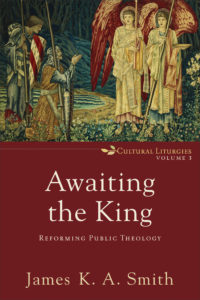 And, to be utterly relevant and timely, the book that we just named as The Hearts & Minds Book of the Year for 2017 (in the last BookNotes) is the brand new Awaiting the King: Reforming Public Theology (Baker Academic; $22.99.) It is, in fact, an ongoing ecumenical conversation about Kuyperian thought. That James K.A. Smith somewhat deconstructs the notion of worldview (especially in the first of the “Cultural Liturgy” trilogy, Desiring the Kingdom) is only further proof that this topic is hot, that we have to deepen and widen our conversation about what we mean by worldview, and how it impacts our public theology. Smith knows Dooyeweerd well, and his own popular work is in no small way indebted to the Institute for Christian Studies where he did his own formative graduate work.
And, to be utterly relevant and timely, the book that we just named as The Hearts & Minds Book of the Year for 2017 (in the last BookNotes) is the brand new Awaiting the King: Reforming Public Theology (Baker Academic; $22.99.) It is, in fact, an ongoing ecumenical conversation about Kuyperian thought. That James K.A. Smith somewhat deconstructs the notion of worldview (especially in the first of the “Cultural Liturgy” trilogy, Desiring the Kingdom) is only further proof that this topic is hot, that we have to deepen and widen our conversation about what we mean by worldview, and how it impacts our public theology. Smith knows Dooyeweerd well, and his own popular work is in no small way indebted to the Institute for Christian Studies where he did his own formative graduate work.
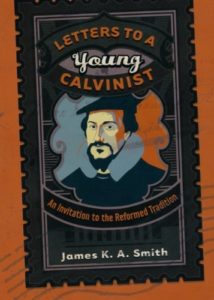 I loved that at our Full-Bodied Community conference, speaker Gail Heffner quoted at length from Smith’s small but wise and very informative book Letters to a Young Calvinist: An Invitation to the Reformed Tradition (Brazos; $14.99) which reminds those of us in the Reformed tradition (and others too) that our faith need not be conservatively doctrinaire but opened up to fresh insights about the creation, that we stand within an on-going, broad, catholic tradition, and that we can appreciate both John Piper and Abraham Kuyper.
I loved that at our Full-Bodied Community conference, speaker Gail Heffner quoted at length from Smith’s small but wise and very informative book Letters to a Young Calvinist: An Invitation to the Reformed Tradition (Brazos; $14.99) which reminds those of us in the Reformed tradition (and others too) that our faith need not be conservatively doctrinaire but opened up to fresh insights about the creation, that we stand within an on-going, broad, catholic tradition, and that we can appreciate both John Piper and Abraham Kuyper.
And, by the way, as Gail and Ken walked us through a beautiful Biblical narrative, inviting us to embody wonder, lament, and reconciliation, they used evocative music and a powerful video clip of the movie trailer for the just-released Wendell Berry documentary, “Look and See.” Although Gail has come to know Wendell, she was reading him in the early 80s, when we shared a copy of The Unsettling of America. Her use of this Berry poem and the vivid 2-minute video was a highlight of the event and well worth watching.
Further, for what it is worth, N.T. Wright readily admits to having learned much of his most foundational approach to worldviews (see, for instance, the first major volume of his influential “Christian Origins and the Question of God” series) to then ICS professor of Worldview Studies, Brian Walsh. Brian used to do CCO staff training and has spoken at Jubilee as has his ICS colleague from those years, Al Wolters. I don’t know if Wright has read any Dooyeweerd, or even much Kuyper, but his overall perspective is shaped by 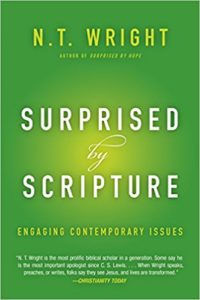 some of the same influences from Toronto that captured my attention decades ago. I know a Kuyperian friend who just used with great success a collection of talks by Wright on how the Bible speaks to many issues in contemporary culture, from creation care to the arts, from the sciences to the role of women in society. I love reading Wright and commend this diverse collection of talks he gave that were not primarily in settings of theologians or Bible scholars, but professional associations, artists, scientists, social justice activists and the like. See Surprised by Scripture: Engaging Contemporary Issues (HarperOne; $15.99.)
some of the same influences from Toronto that captured my attention decades ago. I know a Kuyperian friend who just used with great success a collection of talks by Wright on how the Bible speaks to many issues in contemporary culture, from creation care to the arts, from the sciences to the role of women in society. I love reading Wright and commend this diverse collection of talks he gave that were not primarily in settings of theologians or Bible scholars, but professional associations, artists, scientists, social justice activists and the like. See Surprised by Scripture: Engaging Contemporary Issues (HarperOne; $15.99.)
See? I’m not making this stuff up. Kuyper’s influences, in ways direct and indirect, are everywhere. And it’s good stuff.
One of the widely anticipated and certainly most-discussed theological works of the year, Smith’s Awaiting… is in direct conversation with this material. And one of the most acclaimed theological and Biblical scholars of our time, Tom Wright, has been influenced by those in the line of Pete Steen.
And so, we went to this “Full Bodied Community” conference, to share in some old memories from some old friends whose lives paralleled my own, but also to name ways in which this reformational legacy in Western PA could be made fresh for the 21st century. It was, for me, a metaphorical exercise in connecting the dots.
And for our friend Sean Purcell, it was a literal exercise in illustration. What fun!
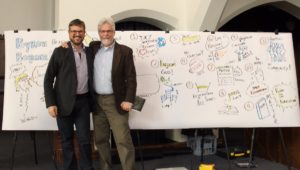
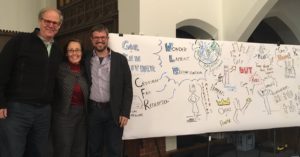
As you can see above, I got to do one of the plenary talks, as did our best friends Ken & Gail Heffner who are both on staff at Calvin College in Grand Rapids. (I think videos of these will be available on line before too long.) And Sean drew and drew as we talked.
Other folks spoke on topics as interesting as the “Joy in Learning” curriculum used in some of the innovative Christian schools and Pittsburgh’s own Mr. Robert Lavelle’s famous radical, inner-city bank, Dwelling House Savings and Loan, and interviews and conversations about how we move from “worldview to way of life” and how to take “worldview to work.”
A few big questions loomed – where to we go from here? How can we make a transforming difference in our own places? How do we keep hope alive in these times, pressing into visions of vocation? How might we encourage ministries like the CCO and their wonderful Jubilee conference to remain true to their earliest ideals and goals? What is the role of intentional community? We were so glad to see some friends from the Bruderhof there, and we should have drawn them into the conversation more, since they have great experience with communal living inspired by the New Testament.(I was glad we had some of their books, beautifully published by their Plough Publishing.) And, always, how to we find time and space not only to pray and be shaped by spiritual disciplines to sustain us but how do we find time and space to read, learn, discuss, dialogue and become the “communities of discourse” that world-changing communities need to be? In an era when we are busier then ever, and the issues are more complex then ever, we simply have to be life-long learners, loving books as much as Kuyper and Steen did!
It is a burning question for my vocation, and yours, too, no doubt: how do we get folks to read more deeply as Steen always challenged us to do?
How does the ecumenical and missional church movement fund a Kingdom imagination that bears fruit in but not of the world around us? (I reminded folks that it was Steen that gave me my first book by Walter Brueggemann, The Land, and Walt’s Prophetic Imagination remains a fertile text for all such conversations about faithful living.)
And, too, quite urgently, we asked out loud how tragic social realities such as income inequality and white privilege and current climate changes effect how we live out robust, missional discipleship these days?
What will it take for us to become known as men and women of Issachar (I Chronicles 12:32) who “knew the times and knew what God’s people should do”?
Dare we “take courage and work” waiting for God to bring peace to our places (as in Haggai 2?)
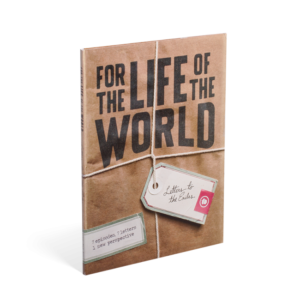 Can we truly be innovative as we serve “For the Life of the World” – as in the beautiful DVDs created by Kuyperians, published by the Roman Catholic Acton Institute, named after a book by Russian Orthodox theologian Alexander Schmemann?
Can we truly be innovative as we serve “For the Life of the World” – as in the beautiful DVDs created by Kuyperians, published by the Roman Catholic Acton Institute, named after a book by Russian Orthodox theologian Alexander Schmemann?
That is a great, great resource and a beautifully fun way to enter this Kuyperian conversation. If you’ve never seen it, drop everything and watch the trailer for it here. (It retails for $25.00 but with the 20% off discount it’s just $20.00. and worth every penny.) In one of the episodes, the host, Evan, is wearing a Kuyper tee-shirt. (In other episodes he is wearing the visage of other key writers, like the Catholic poet Gerard Manley Hopkins and the aforementioned Alexander Schmemann. Another has Hans Urs von Balthasar, a Catholic theologian known for writing, densely, about beauty. How funny!)
Maybe there in those tee shirts is a clue to living faithfully and holistically in the new era: we must be ecumenical. We must read widely. We must learn from each other.
Which brings us back to why we do what we do, developing ecumenical book lists and curating book displays for important gatherings and running this small town bookstore, working with local customers and area churches. We’d like to think that our work is in service to this big Kingdom vision, helping God’s glory to be known as the culture is renewed and as human flourishing takes roots in every zone of life, all over the place. We learned that mostly from Pete Steen, I suppose, and we not only want to honor him, but thank all of those who reminded us of him this past weekend by participating in the Pittsburgh Full Bodied Community gathering.
And to all our customers who have read along with us thus far – again, thank you. We hope you enjoyed learning yet again a bit about at least part of our story, and hope that we can somehow serve you in yours. Together, despite the oddness of our times, and the diversity of our own stories and influences, with God’s help, we can carry on.
SOME VITAL, RELEVANT BOOKS
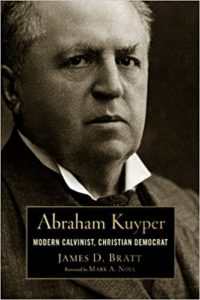 Abraham Kuyper: Modern Calvinist, Christian Democrat James Bratt (Eerdmans) $24.99 Okay, this is the big, real deal. This is surely the definitive biography, almost 500 pages, certainly the best yet — with lots about his political views and his struggles in public life. It is well written and, I might add, by a guy who knew Steen back when he lived in Pittsburgh. Dr. Bratt is now an esteemed professor of history at Calvin College. See a great review of the book, here.
Abraham Kuyper: Modern Calvinist, Christian Democrat James Bratt (Eerdmans) $24.99 Okay, this is the big, real deal. This is surely the definitive biography, almost 500 pages, certainly the best yet — with lots about his political views and his struggles in public life. It is well written and, I might add, by a guy who knew Steen back when he lived in Pittsburgh. Dr. Bratt is now an esteemed professor of history at Calvin College. See a great review of the book, here.
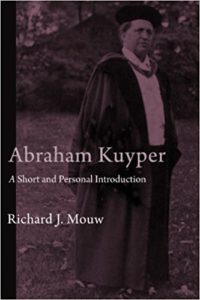 Abraham Kuyper: A Short and Personal Introduction Richard Mouw (Eerdmans) $16.00 This is the shortest most delightful introduction to Kuyper (and why he matters today) that we know of and we really hope you will consider it. Whether one is seriously interested in this particular strain of the Dutch Reformed tradition or not, one really ought to know a bit about this heroic leader and seminal thinker. I can name a handful of lesser known theological voices and Christian saints we simply all should know. This is one. I love this book. Highly recommended.
Abraham Kuyper: A Short and Personal Introduction Richard Mouw (Eerdmans) $16.00 This is the shortest most delightful introduction to Kuyper (and why he matters today) that we know of and we really hope you will consider it. Whether one is seriously interested in this particular strain of the Dutch Reformed tradition or not, one really ought to know a bit about this heroic leader and seminal thinker. I can name a handful of lesser known theological voices and Christian saints we simply all should know. This is one. I love this book. Highly recommended.
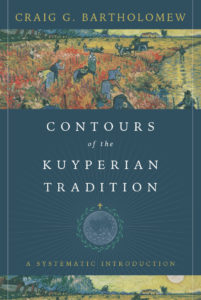 Contours of the Kuyperian Tradition: A Systematic Introduction Craig Bartholomew (IVP Academic) $40.00 I’m soon going to announce this as an award-winning “Best of” book for 2017 so, again, if you are even vaguely interested in this deep and profound tradition, this is one of the best resources in which you can invest. Get this book, work through it carefully, learn and be aware of the extraordinary riches in this complex, century-old tradition of Christian worldview thinking and social renewal. It has become a touchstone for this tradition, a very important resource.
Contours of the Kuyperian Tradition: A Systematic Introduction Craig Bartholomew (IVP Academic) $40.00 I’m soon going to announce this as an award-winning “Best of” book for 2017 so, again, if you are even vaguely interested in this deep and profound tradition, this is one of the best resources in which you can invest. Get this book, work through it carefully, learn and be aware of the extraordinary riches in this complex, century-old tradition of Christian worldview thinking and social renewal. It has become a touchstone for this tradition, a very important resource.
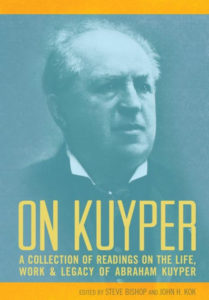 On Kuyper: A Collection of Readings on the Life, Work & Legacy of Abraham Kuyper edited by Steve Bishop & John Kok (Dordt College Press) $36.00 When this came out a few years ago I thought to myself as I opened the cover of the slightly over-sized book, that this was a book Steen would have insisted we all read. It is a collection of essays about Kuyper, yes. It is also a collection of those truly in the known, those who are living out this Kuyperian, neo-Cal, reformational worldviewy stuff, with vibrancy and radical insight. It breaths ongoing reform, it cries out to be taken seriously. It is both academic — some of the essays are rigorous theologically and/or philosophically, but they have this lively trajectory towards making a difference in God’s world. That is, it isn’t armchair speculating, it isn’t arcane study for the sake of the academic guild. This is a vital collection of reformational dynamite — highly recommended.
On Kuyper: A Collection of Readings on the Life, Work & Legacy of Abraham Kuyper edited by Steve Bishop & John Kok (Dordt College Press) $36.00 When this came out a few years ago I thought to myself as I opened the cover of the slightly over-sized book, that this was a book Steen would have insisted we all read. It is a collection of essays about Kuyper, yes. It is also a collection of those truly in the known, those who are living out this Kuyperian, neo-Cal, reformational worldviewy stuff, with vibrancy and radical insight. It breaths ongoing reform, it cries out to be taken seriously. It is both academic — some of the essays are rigorous theologically and/or philosophically, but they have this lively trajectory towards making a difference in God’s world. That is, it isn’t armchair speculating, it isn’t arcane study for the sake of the academic guild. This is a vital collection of reformational dynamite — highly recommended.
Here is how the publisher explains it’s importance:
This anthology gathers thirty-one articles, some in print for the first time, from twenty-eight authors who use the Kuyperian framework to critique and to develop Christian perspectives on, among other things, the church, culture, gender, common grace, education, politics, scholarship, fashion, art, science, and evolution. This book provides an introduction to Kuyper’s life and thought through the eyes of others. The breadth and scope of these articles stand as testimony to Abraham Kuyper’s desire to see the lordship of Christ extend to every area of life.
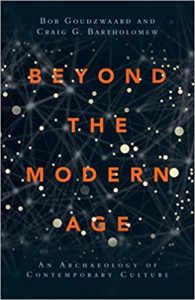 Beyond the Modern Age: An Archaeology of Contemporary Culture Bob Goudzwaard & Craig Bartholomew (IVP Academic) $30.00 I hope you saw my long review of this marvelously profound work in BookNotes when it first came out. Goudzwaard (who I mentioned in my above narrative) is certainly is one of the most significant Christian leaders of our time that most never heard of. This is his studious bit of cultural criticism, not just about economics (although that is his field and he makes significant economic proposals nearer the end.) Heady as it is, he has a knack for summarizing and clarifying profound thinkers and there is a delightful device in the book where a group of college students are involved, asking questions and offering feedback. That makes it more readable and approachable and less abstract.
Beyond the Modern Age: An Archaeology of Contemporary Culture Bob Goudzwaard & Craig Bartholomew (IVP Academic) $30.00 I hope you saw my long review of this marvelously profound work in BookNotes when it first came out. Goudzwaard (who I mentioned in my above narrative) is certainly is one of the most significant Christian leaders of our time that most never heard of. This is his studious bit of cultural criticism, not just about economics (although that is his field and he makes significant economic proposals nearer the end.) Heady as it is, he has a knack for summarizing and clarifying profound thinkers and there is a delightful device in the book where a group of college students are involved, asking questions and offering feedback. That makes it more readable and approachable and less abstract.
Listen to how the publisher describes this important volume:
The modern age has produced global crises that modernity itself seems incapable of resolving deregulated capitalism, consumerism, economic inequality, militarization, overworked laborers, environmental destruction, insufficient health care, and many other problems. The future of our world depends on moving beyond the modern age. Bob Goudzwaard and Craig G. Bartholomew have spent decades listening to their students and reflecting on modern thought and society. In Beyond the Modern Age they explore the complexities and challenges of our time. Modernity is not one thing but many, encompassing multiple worldviews that contain both the source of our problems and the potential resources for transcending our present situation. Through an archaeological investigation and critique of four modern worldviews, Goudzwaard and Bartholomew demonstrate the need for new ways of thinking and living that overcome the relentless drive of progress. They find guidance in the work of Rene Girard on desire, Abraham Kuyper on pluralism and poverty, and Philip Rieff on culture and religion. These and other thinkers point the way towards a solution to the crises that confront the world today. Beyond the Modern Age is a work of grand vision and profound insight. Goudzwaard and Bartholomew do not settle for simplistic analysis and easy answers but press for nuanced engagement with the ideologies and worldviews that shape the modern age. The problems we face today require an honest, interdisciplinary, and global dialogue. Beyond the Modern Age invites us to the table and points the way forward.
And read carefully these fine endorsements by folks who represent different theological and cultural views; it is an education just reading how they briefly interact with the book:
Beyond the Modern Age is essential reading for all seeking to navigate their way through the complex cultural and worldview issues associated with the modernization of our world. Offering skillful and insightful analysis shaped and informed by the Kuyperian tradition, Goudzwaard and Bartholomew guide readers through the worlds of philosophy, economics, politics, theology, and culture in a compelling way. This volume is vitally important not because all readers will agree with the proposals and conclusions offered, nor because the authors provide us with a final word, but because Goudzwaard and Bartholomew have constructively advanced the conversation and modeled the kind of serious intellectual engagement needed by thoughtful Christians in our day. (David S. Dockery, president, Trinity International University)
This is an invaluable contribution to the necessary conversation about the worldviews shaping modernity and its cultures; it is an important primer for living in a confessionally pluralistic Western society. More importantly, it articulates the way an authentically Christian worldview can disclose the fault lines of contemporary worldviews and open up alternative and constructive paths forward from the seemingly intractable problems we face. (Bruce J. Clemenger, president, The Evangelical Fellowship of Canada)
As a consequence of the process of globalization, the inner contradictions of modernity have become apparent. In particular, the affirmation that modernization inevitably leads to secularization is being questioned in view of the so-called ‘return of religion.’ People are beginning to critically review the basic assumptions of the modern worldview, looking for new perspectives of meaning in the highly confusing contemporary world. The new publication Beyond the Modern Age by Bob Goudzwaard and Craig G. Bartholomew offers a constructively critical approach to the economic, social, and environmental challenges facing the globalized society. Both authors are rooted in the ‘reformational,’ neo-Calvinist tradition of Christian social thinking initiated by Abraham Kuyper. The book grew out of a course for students that Bob Goudzwaard has taught for many years. It has retained the attractive character of an argument developed in dialogical partnership with students drawn from different parts of the world. The authors take the reader through an informed review of the historical origins of the modern worldview and the main efforts to critically adjust it in response to its inner paradoxes. Taking their cues from contemporary scholars like José Casanova, Philip Rieff, René Girard, and Lenn E. Goodman, they seek to move beyond the ideological constraints of the modern worldview by arguing for a biblically rooted perspective from ‘outside’ that opens up constructive ways of thinking and acting while respecting the plurality of worldviews. The book can be recommended as an excellent textbook for courses in contemporary Christian social philosophy. (Konrad Raiser, former general secretary of the World Council of Churches)
I suppose this isn’t a “selling point” to most BookNotes readers, but in keeping with my theme, above, I can say with certainty that if Pete Steen were alive, he’d make us all read this book. Interestingly, there is a marvelous Epilogue written by – yep – a former Pittsburgher, our dear pal Mark Vandervennen, explaining a bit about Goudzwaard’s very interesting life and many public accomplishments, some of which are quite remarkable.
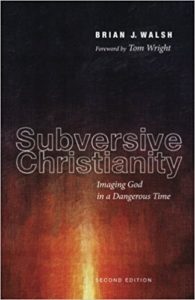 Subversive Christianity: Imaging God in a Dangerous Time Brian Walsh (Wipf & Stock) $17.99 I have often said in these pages that Walsh is an author well worth reading, one of my favorites. I won’t recount all that now (although I explain about his body of work and review his latest one, here.) I really wanted to hold this one up as an example of the sorts of powerful, Biblical, culturally-engaged, transforming vision that we heard from Steen and Vandezande and others critics of the status quo that so influenced many of us years ago. This one takes seriously the sadness of our times and, in a way, move further into the study of the “idols of the age” that appeared concisely in Transforming Vision and Truth is Stranger Than It Used to Be. This short book includes extraordinarily insightful talks and sermons — one given at Jubilee, in fact — drawing inspiration on poets and thinkers from Bob Goudzwaard to Bruce Cockburn to Walter Brueggemann. Tom Wright offers a very enthusiastic forward; I’ve even got a blurb on the back. This second edition has a powerful radded chapter that is worth the price of the book as Walsh challenges us to live into the redemptive Biblical story with guts and grace. Subversive Christianity: Imaging God… book will make you think, especially in these dangerous times. I promise you.
Subversive Christianity: Imaging God in a Dangerous Time Brian Walsh (Wipf & Stock) $17.99 I have often said in these pages that Walsh is an author well worth reading, one of my favorites. I won’t recount all that now (although I explain about his body of work and review his latest one, here.) I really wanted to hold this one up as an example of the sorts of powerful, Biblical, culturally-engaged, transforming vision that we heard from Steen and Vandezande and others critics of the status quo that so influenced many of us years ago. This one takes seriously the sadness of our times and, in a way, move further into the study of the “idols of the age” that appeared concisely in Transforming Vision and Truth is Stranger Than It Used to Be. This short book includes extraordinarily insightful talks and sermons — one given at Jubilee, in fact — drawing inspiration on poets and thinkers from Bob Goudzwaard to Bruce Cockburn to Walter Brueggemann. Tom Wright offers a very enthusiastic forward; I’ve even got a blurb on the back. This second edition has a powerful radded chapter that is worth the price of the book as Walsh challenges us to live into the redemptive Biblical story with guts and grace. Subversive Christianity: Imaging God… book will make you think, especially in these dangerous times. I promise you.
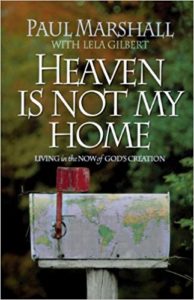 Heaven is Not My Home: Living in the Now God’s Creation Paul Marshall (Nelson) $15.99 I know this title turns off some people, but it really is one of the finest books about Christian living in the modern world of which I know. Marshall, now a world-renowned expert on human rights in the modern world (and especially human rights violations against people of faith and the particular injustices within the Muslim world), started out as a professor at Toronto’s ICS. He wrote this book – in part with encouragement from Os Guinness, I’ve heard – to flesh out a balanced and coherent Christian perspective on all of life.
Heaven is Not My Home: Living in the Now God’s Creation Paul Marshall (Nelson) $15.99 I know this title turns off some people, but it really is one of the finest books about Christian living in the modern world of which I know. Marshall, now a world-renowned expert on human rights in the modern world (and especially human rights violations against people of faith and the particular injustices within the Muslim world), started out as a professor at Toronto’s ICS. He wrote this book – in part with encouragement from Os Guinness, I’ve heard – to flesh out a balanced and coherent Christian perspective on all of life.
There are just wonderful, playful, interesting chapters that offer expert advise on thinking faithfully about work, rest, business, the arts, recreation, technology, citizenship and more. This “all of life redeemed” worldview is shown not to be an abstract notion but truly a guiding bit of wisdom for faithful whole-life discipleship. The chapters on the “full gospel” as seen as the telling of the creation/fall/redemption story are classic; the chapter on worship and the chapter on evangelism are lovely and wise. This is a handbook for missional living written before anyone used that word and it is lively reformational worldview without jargon or philosophy. It would make a great group study, introducing folks in a winsome way to a better, wholistic vision of Kingdom living, covering sides of life we all, in fact, have to engage and into which surely the gospel speaks.
I am sure you know we recommend “worldview” books often, and we implore folks to read titles such as (my favorite) The Transforming Vision: Shaping a Christian Worldview by Brian Walsh & Richard Middleton (IVP; $22.00) and the classic, influential, Creation Regained: The Biblical Basis for a Reformational Worldview by Albert Wolters (Eerdmans; $15.00); we often suggest the pleasant and inviting Heaven is a Place on Earth: Why Everything You Do Matters to God by Michael Wittmer (Zondervan; $16.99) and Mark Bertrund’s wonderful, engaging (Re)Thinking Worldview: Learning to Think, Live, and Speak in the World (Crossway; $22.99.) For real beginners or interested teen readers I suggest the fun The Story of Everything: How You, Your Pets, and the Swiss Alps Fit Into God’s Plan for the World by Jared C. Wilson (Crossway; $15.99.)
But you know what? As much as I love these worldview books and as committed as we are to stocking them, this Paul Marshall book about actually living out faith in distinctive, normative ways in various sides of life really does capture what it is all about. Don’t skip the studies of worldviews themselves, but, really, Heaven Is Not My Home is a gem. Highly recommended.
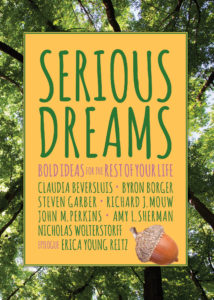 Serious Dreams: Bold Ideas for the Rest of Your Life edited by Byron Borger (Square Halo Books) $14.99 I was thinking of highlighting this in my “Full Bodied Community” book announcement but just ran out of time, so never mentioned it. Since I edited it myself, it always feels awkward to promote it. However, I’m a believer in this book and just recently got an exceptionally moving note from a reader who shared how much the book helped him.
Serious Dreams: Bold Ideas for the Rest of Your Life edited by Byron Borger (Square Halo Books) $14.99 I was thinking of highlighting this in my “Full Bodied Community” book announcement but just ran out of time, so never mentioned it. Since I edited it myself, it always feels awkward to promote it. However, I’m a believer in this book and just recently got an exceptionally moving note from a reader who shared how much the book helped him.
It started, as you may know, with a commencement address I gave at Geneva College in which I made a reference or two to Pete Steen and his impact there. When folks wanted copies of my speech, I decided to add in a bunch of others that offered similarly visionary graduation addresses that celebrate integrated Christian learning, a deep vision of vocation and call, a dream of seeking meaning and purpose as we serve God by serving the common good. Funny, I think most of the speakers whose talks I included in the book knew Pete Steen and most would call themselves, in one way or another, Kuyperians, or at least have learned to think “wordlviewishly” in conversation with reformational folk. From Steve Garber to Richard Mouw, Amy Sherman to John Perkins, Nicholas Wolterstorff to Claudia Beversluis, these are all fabulous chapters, to which we’ve added some reflection questions. I also did a forward that many have found helpful and our friend Erica Young Reitz (of After College fame) wrote a great, practical epilogue. Serious Dreams is compact, colorful, and is, obviously, a great gift for those graduating from college and taking up new callings and careers. But, frankly, is seemed right to share it with this crowd at this event and I wish I’d have promoted it there. So here ya, go — I’d even sign ’em if you order now.

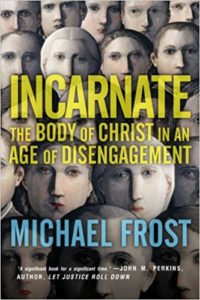 Incarnate: The Body of Christ in an Age of Disengagement Michael Frost (IVP) $16.00 This brilliant work is both a cultural analysis — in the virtual age we tend towards disengagement, almost gnostic — and it is a call to be the local church, living for real in the local Body in a local place. My goodness, this is deeply profound, an important contribution to what it means to be embodied.
Incarnate: The Body of Christ in an Age of Disengagement Michael Frost (IVP) $16.00 This brilliant work is both a cultural analysis — in the virtual age we tend towards disengagement, almost gnostic — and it is a call to be the local church, living for real in the local Body in a local place. My goodness, this is deeply profound, an important contribution to what it means to be embodied.
It is a great example of what Michael Frost and other missional writers are doing — exegeting the culture and thinking about the implications of our North American context for how we do church and live our our discipleship.
You know, that Kuyperian type conference in Pittsburgh really was also about community; Full Bodied Community they allusively called it. I think one of the reasons that intentional house-holding experiments grew up in the wake of Steen teaching was that he often critiqued a false dualism — Plato’s dichotomy between the body and soul or, as it is sometimes put, the flesh and the spirit, or as in the church’s classic split between sacred and secular. Steen suggested that sometimes this was nearly the heresy of gnosticism, and once we had a robust, Hebraic view of the creation, and a “creation-restored” view of redemption, then we need a full-bodied, real-world, life-on-life view of the church. If Steen were around today, he’d love this book, and anybody who talks about being reformational should know it. Michael Frost is a remarkable writer and we should follow his work closely.
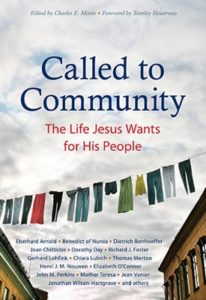 Called to Community: The Life Jesus Wants for His People edited by Charles Moore (Plough Publishing) $18.00 Like the above listed books, I reviewed this at length in a previous BookNotes column. It obviously needs to be noted here as any conversation about community – whether it is intentional house-holding or just “doing life together” with fellow-travelers, or trying to figure what it means to be the local church – can wonderfully benefit from this utterly delightful collection. Included are authors that are wise and diverse, short pieces by Bonhoeffer, Eberhard Arnold, C.S. Lewis, Saint Benedict, Jean Vanier, Thomas Merton, Eugene Peterson, Richard Foster, John Perkins, Christine Pohl, Joan Chittister, and so many more. Very highly recommended.
Called to Community: The Life Jesus Wants for His People edited by Charles Moore (Plough Publishing) $18.00 Like the above listed books, I reviewed this at length in a previous BookNotes column. It obviously needs to be noted here as any conversation about community – whether it is intentional house-holding or just “doing life together” with fellow-travelers, or trying to figure what it means to be the local church – can wonderfully benefit from this utterly delightful collection. Included are authors that are wise and diverse, short pieces by Bonhoeffer, Eberhard Arnold, C.S. Lewis, Saint Benedict, Jean Vanier, Thomas Merton, Eugene Peterson, Richard Foster, John Perkins, Christine Pohl, Joan Chittister, and so many more. Very highly recommended.
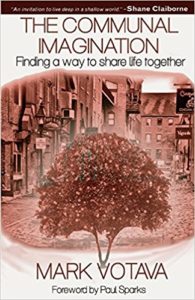 The Communal Imagination: Finding a Way to Share Life Together Mark Votava (Createspace) $14.99 I suspect you’ve never heard of this great and provocative book. There isn’t too much that we highly recommend for those wanting to truly live together within an intentional community and although this has great benefit for folks in such households, it is good for anyone, I think. It isn’t the most beautifully written book you’ll ever come across, but I’m convinced we need to read this book! We may not all be able to move near one another and most churches don’t have the capacity to make this happen, but to at least read about it as a goal, or part of our imagination, at least, could be valuable, eh?
The Communal Imagination: Finding a Way to Share Life Together Mark Votava (Createspace) $14.99 I suspect you’ve never heard of this great and provocative book. There isn’t too much that we highly recommend for those wanting to truly live together within an intentional community and although this has great benefit for folks in such households, it is good for anyone, I think. It isn’t the most beautifully written book you’ll ever come across, but I’m convinced we need to read this book! We may not all be able to move near one another and most churches don’t have the capacity to make this happen, but to at least read about it as a goal, or part of our imagination, at least, could be valuable, eh?
Here is how the publisher describes it, by explaining the importance for church folk to live nearby and create a lively spirituality, together, within the context of life together in a neighborhood:
We need to create the context to reimagine the body of Christ in everyday life as embodied through its proximity and shared life together. Without the value of inhabiting and listening to the place where we live, we will have very little expression of faith together in everyday life. There needs to be an embodied expression for our ecclesiology to make sense. If we do not have a local expression together, we will create a duality between our spirituality and our everyday lives in the ordinary. The Communal Imagination will draw out a new way of being for ourselves into this transition of embodied expression by stressing the importance of proximity and shared life within a particular neighborhood where we live, work and play.
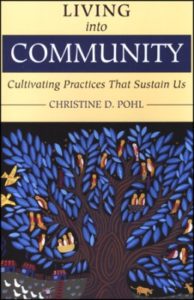 Living Into Community: Cultivating Practices That Sustain Us Christine Pohl (Eerdmans) $20.00 One of the most important books of the last decade, I think, one that smart and informed folks everywhere tell me they appreciate, is the hefty but deeply wise Making Room: Recovering Hospitality as a Christian Tradition. This isn’t precisely a sequel, but it is similar in that it is based on some research (interviews with lots of church folk, pastors and congregants) and great Bible study. She offers four chief practices that sustain our life together and also explores those things that weakens each of those practices. Pohl teaches social ethics as Asbury Seminary so is connected profoundly to both the evangelical tradition and a mainline denomination, so she has very much to offer us all.
Living Into Community: Cultivating Practices That Sustain Us Christine Pohl (Eerdmans) $20.00 One of the most important books of the last decade, I think, one that smart and informed folks everywhere tell me they appreciate, is the hefty but deeply wise Making Room: Recovering Hospitality as a Christian Tradition. This isn’t precisely a sequel, but it is similar in that it is based on some research (interviews with lots of church folk, pastors and congregants) and great Bible study. She offers four chief practices that sustain our life together and also explores those things that weakens each of those practices. Pohl teaches social ethics as Asbury Seminary so is connected profoundly to both the evangelical tradition and a mainline denomination, so she has very much to offer us all.
As Marva Dawn puts it, “Every Christian should read this provocative book!”
Marva continues,
Christine thoroughly delineates the interlocking relationships and dangerous deformities of practices that could deepen our communities but often destroy them. This volume is pertinent to our families, churches, even places of work.
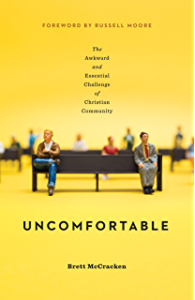 Uncomfortable: The Awkward and Essential Challenge of Christian Community Brett McCracken (Crossway) $15.99 . This recent book has gotten some great, great reviews since it came out a month or so ago, and we really want to tell you about it. It isn’t about alternative Christian communes, really, but more about why ordinary church life should be more relational and real, and why we simply have to be a part of a local congregation to thrive as a Christian. Yes, yes, we mostly know that, but McCracken shows — in prose that’s pretty cool and candid — that this is, if we are truly doing it, going to be awkward. Messy, as we sometimes say. John Ortberg, a writer I so admire, has a few books about how our own sin and foibles, and the sin and foibles of others, have to be admitted in community, so we can take people “as is.” (See his wonderful Everybody’s Normal Till You Get to Know Them [Zondervan; $15.99.])
Uncomfortable: The Awkward and Essential Challenge of Christian Community Brett McCracken (Crossway) $15.99 . This recent book has gotten some great, great reviews since it came out a month or so ago, and we really want to tell you about it. It isn’t about alternative Christian communes, really, but more about why ordinary church life should be more relational and real, and why we simply have to be a part of a local congregation to thrive as a Christian. Yes, yes, we mostly know that, but McCracken shows — in prose that’s pretty cool and candid — that this is, if we are truly doing it, going to be awkward. Messy, as we sometimes say. John Ortberg, a writer I so admire, has a few books about how our own sin and foibles, and the sin and foibles of others, have to be admitted in community, so we can take people “as is.” (See his wonderful Everybody’s Normal Till You Get to Know Them [Zondervan; $15.99.])
McCracken asks some uncomfortable questions here, asking why we fear discomfort? Why do we take the easy way? What could church look like if we weren’t consumers looking for easy answers? How can the gospel transform our self-centeredness and help us be the Body of Christ? His view of the church is solid, mature, but expressed in a lively style. A very fine book.
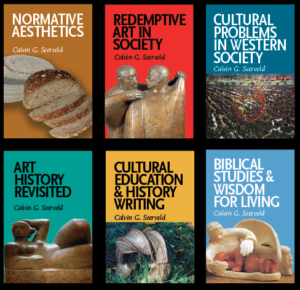 Cultural Problems in Western Society Calvin Seerveld (Dordt College Press) $18.00
Cultural Problems in Western Society Calvin Seerveld (Dordt College Press) $18.00
Cultural Education and History Writing Calvin Seerveld (Dordt College Press) $23.00
Biblical Studies and Wisdom for Living Calvin Seerveld (Dordt College Press) $25.00
These three which I want to highlight here are part of a six-volume set of what in BookNotes I called “a bona fide publishing event” made up of “Sundry Writings and Occasional Lectures” by the learned and passionate emeritus ICS Professor Seerveld. Others in the set include Normative Aesthetics, Art History Revisited and Redemptive Art in Society and they are each brilliant in their own way. His other work includes his classic books on the arts, Rainbows for the Fallen World and Bearing Fresh Olive Leaves, a marvelous resource on using the Palms in worship (Voicing God’s Psalms) and two very colorful, powerfully written Biblical devotionals that we carry, Take Hold of God and Pull and On Being Human: Imaging God in the Modern World. I suppose some know his drama script based on “Song of Songs” called The Greatest Song which we also stock.
I mention these three above as they seem the closest to the sorts of things Steen specialized in, big picture theorizing about the spirit of the times, Bible-based prophetic critique of the idols of the age, and creative, healing, proposals for social renewal which allows us to, God willing, re-claim and embody gospel hope for our broken but blessed world which is so loved by the Triune God.
Some of the essays in Cultural Problems were lectures given in Western Europe, somewhat about labor issues, somewhat about immigration, and also about the role of the arts in addressing dislocating times. It is incisive and relevant. Here is what the publisher has said to describe some of it:
Seerveld masterfully locates current quandaries in the large timeframe stretching from Ancient Greece to the present, all the while introducing normative alternatives that are biblically oriented.
Funny, but I fear some BookNotes readers may be thinking exactly what I as a young man thought when I heard Steen, who sounded rather like this. Namely, that I loved the energy and vision and sense that it all mattered, but, really – is it practical? People are starving, Seerveld, and you are talking about Greek philosophies and art? Well, if you are thinking that, you are in good company, and brother Calvin himself will not demean or disregard your questions, but will be kind as he walks with you through these very doubts and concerns, showing – if you stick with him – why seemingly arcane philosophical background really, truly matters if we are going to find lasting proposals for our complex times. This is good scholarship, with tones of both the pastoral and prophetic.
Cultural Education & History Writing itself is a remarkable bit of reformational writing, a must-read for anyone wanting to enter this tradition and get the cadences and insights deep into their bones. How do we think about education, about forming others and passing along a built-up body of insights? What is the meaning of history, of our times, and how do we do discern the nature of things as they are related to the past?
Again, quoting from the publishers description, you can hopefully see why this sort of mature (if colorful) writing is illustrative of the visionary stuff we who studied with Pete Steen cut our own teeth on. This is great, provocative, stuff:
Seerveld sees a central role in education for “understanding and developing history,” but then “history” not as rote rehearsal of what has transpired but as past and present events in their complex interrelation. Education is inevitably an induction into our cultural heritage; conceived ecumenically, in the spirit of loving our neighbors and their “mistaken visions,” wherever and whenever they may be. But as Cultural Education and History Writing makes plain, we are initiators — culture-makers, shapers of history, and also history-keepers — as much as we are inductees. These seventeen essays are introduced by Doug Blomberg and Gideon Strauss.
As for Biblical Studies & Wisdom for Living what can I say? The neo-Calvinist worldview of Bavinck and Kuyper and the reformational philosophy of Dooyeweerd and Vollenhoven, and the trajectory it set for Steen’s students in Western PA, leading to the formation of urban housing projects, food co-ops, Christian schools, a Christian arts group, a labor-management reconciliation project, an associated chapter of Christian citizens under the umbrella of CPJ, the energy efficient contracting of Morning Sun Builders, the big Jubilee conference, and even the formation of Hearts & Minds all are finally dependent on the lived out faith of folk inspired by the Bible. Seerveld is an extraordinary expositor, a learned student of the printed page, and his pieces here – some rather academic and meaty, others simple instruction a child can understand – are prayerful and gritty and powerful. They open up the Word for life, allowing the power of God’s revelation in Christ to shine for every square inch. What a unique, passionate book to revisit time and again.
Interestingly, as Sean Purcell was hosting some of the conference, and facilitation some of the panels and on-stage conversations, I saw him carrying his dogeared copy of this, with some yellow sticky-notes affixed. It seems he was thinking, as I was, that this is a book to enhance full-bodied community.
BookNotes

SPECIAL
DISCOUNT
ANY ITEM MENTIONED
20% OFF
order here
takes you to the secure Hearts & Minds order form page
just tell us what you want
inquire here
if you have questions or need more information
just ask us what you want to know
Hearts & Minds 234 East Main Street Dallastown, PA 17313
read@heartsandmindsbooks.com
717-246-3333
